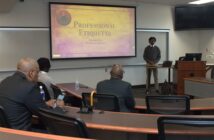Kiyanna Cox Jones, a Lehigh Valley playwright, advocate and educator brought restorative practices to the Touchstone Theatre on East Fourth Street last week with “MAGIC,” an original performance inspired by her personal healing journey as an African American woman.
Throughout the three day-run, Touchstone Theatre hosted four performances of the “restorative theatre celebration of women of color,” as well as a celebration listening circle for women of color and allies, hosted by Jones, Nikki Chamblee and Robin Riley-Casey, according to the theatre’s website.
Jones, Chamblee and Riley-Casey all work at the International Institute of Restorative Practices in North Bethlehem. Jones and Chamblee serve as instructors and implementation coaches, while Riley-Casey is a founding partner of the organization.
Though it originally debuted four years ago, Jones said “MAGIC” underwent a two-month rewrite for its latest production.
“The first one was beautiful, but it didn’t go deep enough for us to think about the idea and perception of magic and the bending it takes to live in the world,” Jones said.
Jones said she restructured the production to add nuance, writing from three perspectives — the body, the soul and the spirit. She also said it’s different from anything else she has written, as she typically writes from a single perspective.
The production serves as a love letter to her daughter, Jones said, offering insights into the dynamics of being a Black woman while addressing themes of racism, body image and self-love.
At the beginning of the production, the main character, Magic, an African American plus-sized woman, feels invisible and silenced. By the end of the performance, she gains confidence and finds her voice through a restorative process and through the support from characters representing her body, spirit and soul.
The restorative process in the performance incorporated rituals, breathing exercises and words of affirmation — reinforcing the message that Magic is majestic, enough and worthy of love.
The performance employed the metaphor of using a “mask” to represent the pressure to fit in or be perfect. By the end, Magic removes her mask, allowing herself to be free without a shield guarding her from the world.
Jones said she used a creative libertarian framework in this production, which combines psychology and spiritual meditation to help connect the cast members with their characters.
“We started every rehearsal with a grounding practice and ended one with a grounding practice,” Jones said.
She also said she had the actors conduct self-character analysis, prompting them to reflect on how they related to their roles.
Juanita Renay, the musical performer and actor who played Magic’s soul, said the grounding exercises helped enhance her performance.
Jones emphasized how the performance was not meant solely to entertain the audience but rather to serve as an experience that provokes dialogue.
Renay said even though the actors were all female, men in the audience shared they took a lot away from the production.
“I appreciated the fact that it was all women on the stage telling a story, because we do have that nurturing side that can get through to people,” Renay said.
Carolyn Frank attended the show and said she felt a range of emotions while watching the story unfold. She felt the pain, struggles and discrimination throughout the performance but said she also saw the joy of sisterhood, family and church.
In her own life, Frank said her faith helps her practice self-care and keeps her grounded.
In the production, the characters encourage Magic to practice self-care by being still and breathing.
Jones said she used to think self-care meant getting her nails or hair done, but now she believes it means listening to her body when she feels overwhelmed and taking time to stop, breathe and rest.
“Even if it’s just 30 seconds, sometimes five minutes is enough, but really allowing my body to be intense in my breath,” she said. “(Self-care) could also mean taking a week of rest without social media.”
Jones said she incorporated Christian biblical references throughout the performance while also aiming to create a spiritual center that blended meditation with Eastern psychology and Afrocentric elements.
Renay said the script for “MAGIC” is filled with topics that people frequently think about, but don’t often talk about out loud.
“We’re still dealing with racism,” Renay said. “Conversations surrounding those topics are hard to have, because you have your allies or you have people totally against you without knowing you first.”






Comment policy
Comments posted to The Brown and White website are reviewed by a moderator before being approved. Incendiary speech or harassing language, including comments targeted at individuals, may be deemed unacceptable and not published. Spam and other soliciting will also be declined.
The Brown and White also reserves the right to not publish entirely anonymous comments.